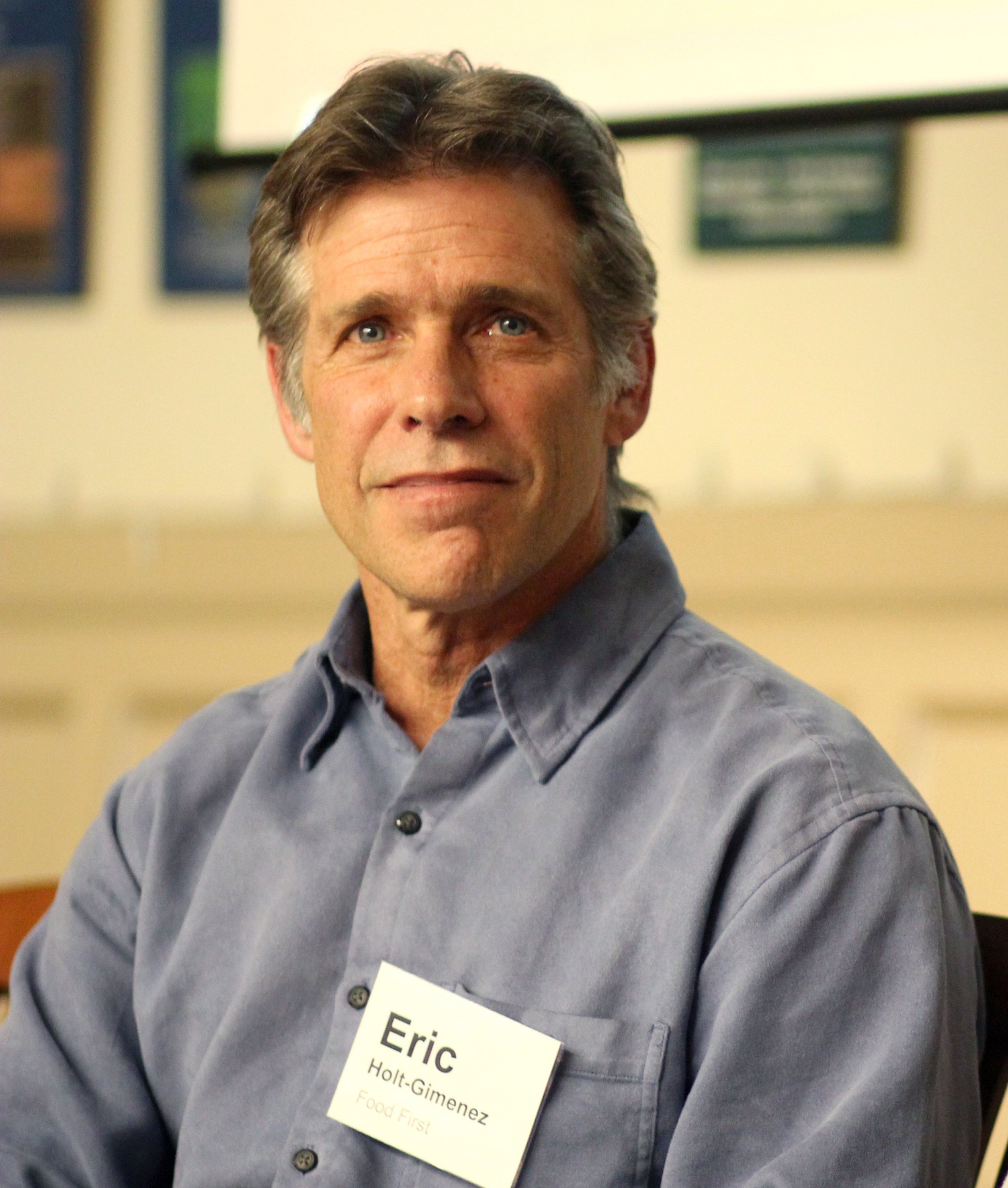A talk by Eric Holt-Giménez and discussion led by Marc Edelman and Karen Washington
This event will be LIVESTREAMED: Go to videostreaming.gc.cuny.edu and click on the link in the “Live Videos” box on the upper right hand side of the page.
Today’s food system has been shaped by the privatization of public goods and the deregulation of corporate capital, leading to the highest levels of global inequality in economic history. The staggering social and environmental costs of this transition have hit people of color the hardest; paring back health, education and welfare functions of government and crippling our capacity to respond to these problems by destroying much of the public sphere. Our communities have been weakened, exacerbating the violence, intensifying racial tensions and deepening cultural divides. In many ways the community food movement, with its projects for a fair, sustainable, healthy food system is rebuilding our public sphere from the ground up. But we can’t rebuild the public sphere without addressing the issues which divide us. For many communities this means addressing racism. Understanding where and how racism manifests itself in the food system, recognizing it within our movement and our organizations and within ourselves is not extra work for an equitable food system; it is the work.
Eric Holt-Giménez has been Executive Director of Food First since 2006. He is the editor of the Food First book Food Movements Unite! Strategies to Transform Our Food Systems; co-author of Food Rebellions! Crisis and the Hunger for Justice with Raj Patel and Annie Shattuck; and author of the book Campesino a Campesino: Voices from Latin America’s Farmer to Farmer Movement for Sustainable Agriculture and of many academic, magazine and news articles. Of Basque and Puerto Rican heritage, Eric grew up milking cows and pitching hay in Point Reyes, CA, where he learned that putting food on the table is hard work. After studying rural education and biology at the University of Oregon and Evergreen State College, he traveled through Mexico and Central America, where he was drawn to the simple life of small-scale farmers.
Marc Edelman’s research and writing have focused on agrarian issues, social movements, and a variety of Latin American topics, including the historical roots of nationalism and contemporary politics. Most of his work has dealt with changing land tenure and land use patterns, production systems, rural class relations, and social movements in Central America. He has a longstanding concern with understanding changing forms of capitalism and with the politics of controlling markets, whether through welfare states, civil society pressure or global trade rules. During the mid 1980s, after seeing his fieldwork zone in northern Costa Rica tragically converted into a staging area for the civil war in Nicaragua, he also carried out research in the USSR and wrote extensively on Soviet-Latin American relations.
Currently, Edelman is working on a project, supported by the National Science Foundation and the PSC-CUNY Grants Program, on the efforts of transnational agrarian movements to have the United Nations approve a declaration on the rights of peasants. He is also completing a book on peasant involvement in global civil society movements and transnational networking among small farmer organizations.
Edelman has served on the editorial boards of American Anthropologist (Book Review Editor, 2002-5), American Ethnologist (2011-), Anuario de Estudios Centroamericanos (Consejo Editorial Internacional, 2008-), Critique of Anthropology (1998-), Cuadernos de Antropología (Comité Científico, 2009-), Culture, Agriculture, Food and Environment (1995-98, 2013-), Focaal – Journal of Global and Historical Anthropology (2004-), Journal of Agrarian Change (2008-), Journal of Latin American Anthropology (1994-99), Journal of Peasant Studies (Editorial Collective, 2009-), Latin American Research Review (2000-2003), NACLA Report on the Americas (1999-2006), Revue TRACE [Travaux et Recherches dans les Amériques du Centre] (2012-), and Studies in Comparative International Development (2005-).
Karen Washington has lived in New York City all her life, and has been a resident of the Bronx for over 26 years. Since 1985 Karen has been a community activist, striving to make the New York City a better place to live. As a community gardener and board member of the New York Botanical Gardens, Karen has worked with Bronx neighborhoods to turn empty lots into community gardens. As an advocate, she has stood up and spoken out for garden protection and preservation. As a member of the La Familia Verde Garden Coalition, she helped launched a City Farms Market, bringing garden fresh vegetables to her neighbors. Karen is a Just Food board member and Just Food Trainer, leading workshops on food growing and food justice to community gardeners all over the city. Karen is a board member and former president of the New York City Community Garden Coalition, a group that was founded to preserve community gardens. She also Co- Founded Black Urban Growers (BUGS) an organization of volunteers committed to building networks and community support for growers in both urban and rural settings. In 2012 Ebony magazine voted her one of their 100 most influential African Americans in the country. Last year she was the recipient of the 2014 James Beard Leadership Award.
Professionally Karen had been a Physical Therapist for 37years, balancing her professional life with community service. Since retiring in April, she plans on pursuing her passion for farming full time .
“To grow your own food gives you power and dignity. You know exactly what you’re eating because you grew it. It’s good, it’s nourishing and you did this for yourself, your family and your community.” Karen Washington
Cosponsored by the Center for Place, Culture and Politics, and the Advanced Research Consortium, Graduate Center, CUNY.
This event is open and free to the public



